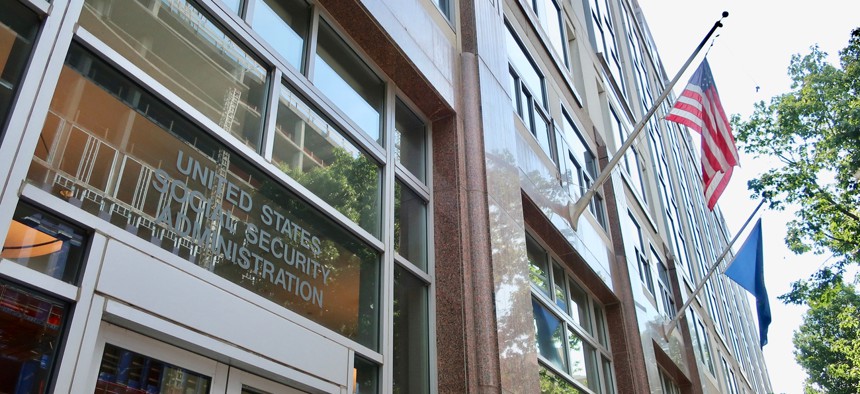
Social Security Administration offices in Washington, D.C. Shutterstock.com
Advocacy Group Urges Biden to ‘Clean House’ at Social Security, Lessen Impact of Payroll Tax Deferral
Under a proposal floated by the organization Social Security Works, federal employees would have twice as long next year to pay back the payroll taxes they were forced to defer by the Trump administration.
A liberal advocacy group focused on preserving and expanding social safety net programs like Social Security and Medicare have urged President-elect Biden to replace the leadership of the Social Security Administration and reverse a number of the Trump administration’s policies in favor of an ethos that supports federal workers.
Social Security Works recently released its “transition report,” dated November 2020, for the incoming Biden administration. Chief among the group’s recommendations is that the next president should “clean house,” forcing Commissioner Andrew Saul to resign or be fired and replacing all political appointees at the agency.
“In only eight of the last 40 years has SSA had Senate-confirmed Democratic leadership,” the organization wrote. “Republican control at the top has brought a number of lower-level appointees whom the Social Security community views as hostile to Social Security. It has also brought harmful regulations, the closing of field offices, reductions in staffing, the termination of annual mailing of earnings statements ... anti-union animus, and other actions and attitudes that have degraded access, diminished service, and reduced confidence in the future of Social Security specifically and government more generally.”
The law states that Saul may only be terminated from his post for “neglect of duty or malfeasance,” but Social Security Works said the recent Supreme Court decision Seila Law LLC v. Consumer Financial Protection Bureau, which limited the independence of the fledgling agency, could grant the president the authority to remove Saul anyway.
The organization, which has opposed payroll tax cuts and tax holidays on the basis that they could hurt the solvency of Social Security in the future, offered its own preferred solution to the fact that the Trump administration has forced a deferral of payroll taxes on executive branch employees between September and the end of the year: giving feds a longer period of time to pay back those deferred taxes next year.
“The mandatory imposition of the deferral on captive federal employees was accurately characterized by Rep. Don Beyer, D-Va., who explained that the Trump administration ‘treats the federal workforce as a guinea pig for a bad policy that businesses already rejected as ‘unworkable,’” the group wrote. “That means those workers confront a substantial reduction in their take home pay from Jan. 1, 2021 to May 1, 2021 ... On Day One, the Biden administration should, through the same executive action [Trump used], extend the number of months over which the deferred contributions must be repaid, so that the amounts withheld are much less burdensome.”
Social Security Works also echoed calls from federal employee unions, civil service and good government organizations in recommending that President-elect Biden rescind a series of executive orders aimed at hamstringing labor groups and making it easier to fire federal employees. Those orders include the controversial trio of anti-union directives, the executive order removing administrative law judges from the competitive service, and the directive instructing agencies to move so-called “policy-making” employees into a new Schedule F in the excepted service, a move that would make those workers effectively at-will employees.
“There are destructive presidential executive orders that affect all civil service employees, including SSA employees, and should be revoked on Day One,” the group wrote. “Similarly, there is at least one destructive order—excepting ALJs from the competitive civil service—that threatens the independence of administrative law judges, most of whom work at SSA. While ALJs work in many agencies, the overwhelming number of ALJs work at SSA. Consequently, that and other destructive orders and regulations have the effect, and likely the intent, of undermining the due process rights of those receiving Social Security and/or [Supplemental Security Income].”
NEXT STORY: Lead Like Leo: Lessons From ‘The West Wing’







